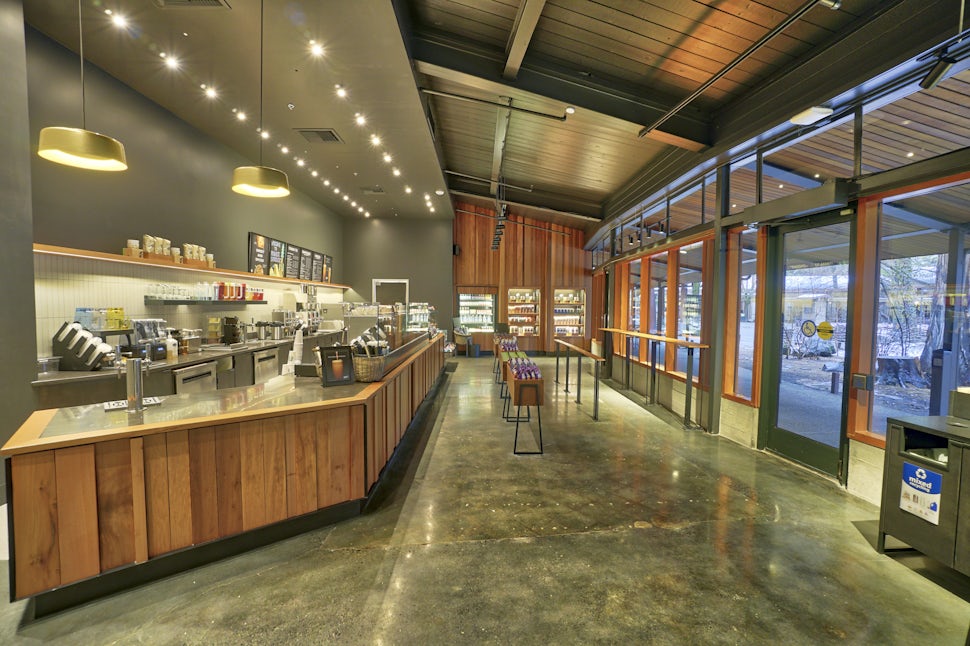A Starbucks Opened in Yosemite Valley and the World Didn't End
In totally unrelated news, Yosemite's 4 Million visitors appear to be hiking slightly faster than usual.

This past week, Starbucks opened a Yosemite Valley location, much to the dismay of the 25,000 people who signed a petition protesting it. It's located at what is now the remodeled Base Camp Eatery at Yosemite Lodge.
The location is LEED certified (the first retail location in Yosemite to achieve that certification), and was built in a space once occupied by a food court, but that has been long vacant. I used to take my lunch breaks in the empty space way back in 2008 when I worked at the lodge, and the space has been an eyesore for years.
Now, why are people upset?
With good reason, there are increasing concerns about the commercialization in our National Parks. From funding getting cut, monuments shrinking and being sold, and a bevy of questionable moves by our Interior Secretary, our public lands are in a dangerous place. However, I think it is important for us as activists to recognize and distinguish between existential threats and things that we perceive as wrong, because a "brand" is putting a coffeeshop in Yosemite.
Yosemite is unique.
Not only in the sense of the incredible granite walls, vistas, and hiking trails, but in how it is developed. I think many people have this idea of "pristine" nature and that somehow an unbranded Starbucks store will ruin all that. I grew up going to Yosemite every year, worked in Yosemite for a summer, and have explored almost every area of the park that's not vertical granite. If there's anything you can call the Valley, it's certainly not "pristine". An unbelievable place to be sure, but on any given day, you'll be sharing those landscapes with thousands of other tourists, international tour groups getting bussed in daily, 4 campgrounds, 2 lodges, a 4-star hotel, a general store, 2 mountain shops, and a bevy of other food establishments. It's closer to Disneyland than untouched wilderness.
All of these concessions are currently run by Aramark, who recently took over the contract from Delaware North Corporation. Private concessionaires have run the services in Yosemite for decades. It is important to note that Aramark is responsible for running all the concessions in the park, NOT the National Parks Service/government. Opinions of the business practices of these companies aside, Aramark is investing in much needed improvements to the park infrastructure and businesses that had seen a steady decline under DNC. Hell, I would have loved to have a Starbucks while I was there, anything is better than the sorry excuse for coffee they were serving at the time.
This development isn't inherently bad (and neither is it inherently good). It's partially because of this accessibility and access to services that Yosemite is so widely visited and beloved by people across the US and worldwide. Access to these places matters in turning people into advocates for the outdoors. I think a thoughtful discussion on the responsibility that NPS has to both provide access and services, and to contrastly preserve wild places as wild is a valid, yet different conversation.
Picking Your Battles
In no way am I saying that folks shouldn't share their opinions and thoughts about places they care about. But in today's non-stop political-crisis climate, I think it is an aspect of activism to research and recognize the battles that are more important than others. A Starbucks in Yosemite (especially in this context) is not going to destroy the fabric of our public lands, and the Valley's unique environment probably isn't the best beachhead for the battle against commercialization.
Is the increased reliance of our public institutions on corporations (due to decreased funding) something to keep an eye on? Absolutely. Things like the Department of the Interior's focus on oil and gas, removal of national monuments, and the slow destruction of the EPA are all important issues of the moment.
If you're looking for a great resource on the legislation and important issues affecting our public lands, I highly recommend the Outdoor Industry Association's Advocacy website, where they do an incredible job of surfacing and researching issues all over the country.
We want to acknowledge and thank the past, present, and future generations of all Native Nations and Indigenous Peoples whose ancestral lands we travel, explore, and play on. Always practice Leave No Trace ethics on your adventures and follow local regulations. Please explore responsibly!
Do you love the outdoors?
Yep, us too. That's why we send you the best local adventures, stories, and expert advice, right to your inbox.









